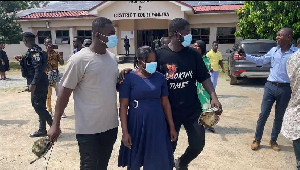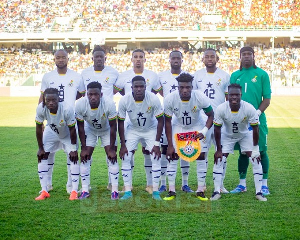Ghana is the latest hot spot of Newmont Mining Corp., the world's biggest gold producer.
Under intense pressure to retain its numero uno position, Denver- based Newmont hopes the West African nation's two gold mines - Ahafo and Akyem - will help replace its constantly depleting reserves and improve production in the coming years.
Newmont currently mines about 9 million ounces of gold per year, of which 7.5 million ounces actually hit the market. To retain that position, the company has to add 9 million ounces in reserves each year. Reserves are estimates of gold deposits that can be mined in a profitable manner.
Also, the impending $1.4 billion merger of AngloGold and Ashanti Goldfields could bring their combined production closer to, or higher than Newmont's and threaten the latter's sway over the industry, unless Newmont increases its reserves.
"Ghana is very, very important to Newmont," said Matt Bender, director of project development at Washington Group International Inc., which provides services to the mining industry. "Newmont does have to replace reserves, either by expanding existing ones or by acquiring new ones. Keeping their number one position is very important since they have such leverage in the industry."
To address those concerns, Newmont is aggressively exploring in Ahafo and Akyem. It is spending nearly $20 million, or one-fifth of its $100 million exploration budget, in Ghana alone. Last year, the budget was $89 million.
When Newmont acquired the mines in February 2002, its reserves were estimated to be 5 million ounces. But that estimate has doubled to 10 million ounces by the end of 2003. Chief geologist Cindy Williams thinks the reserves could grow even more with more in-depth exploration.
Operating costs are estimated to hover from $175 to $185 per ounce at Ahofa and from $160 to $175 at Akyem. This would allow a neat profit margin for Newmont, because the gold price is expected to reach $400 per ounce by next year.
"Ahafo and Akyem could be the next Yanacocha," said Newmont spokesman Doug Hock, referring to the world's largest gold mine, in Peru, where Newmont has a 51.35 percent stake. "They are among Newmont's five core areas of worldwide operations."
Newmont's four other areas of importance are Nevada, Peru, Indonesia and Australia. Newmont's share of Yanacocha has roughly 17 million ounces in reserves, while Nevada has more than 30 million ounces.
Environment and anti-mining groups claim that Newmont's exploration is damaging Ghana's forests and rivers - allegations that Newmont denies.
"It is frightening that Newmont is comparing Ahofa and Akyem to Yanacocha," said Diana Ruiz, spokeswoman of California-based Project Underground. "After what they have done in Peru, the mercury spill and everything, we don't think they should be in Ghana."
Ruiz alleged that Newmont didn't adequately compensate villagers who'd suffered from a June 2002 mercury spill or pay their medical bills.
But Newmont's Hock said the company paid $10 million for cleanups and medical treatment and another $4 million in compensation to 750 people who signed individual settlements. Newmont also paid a $500,000 fine to the Peruvian government.
The Boulder-based Global Response supports a coalition of Ghanaian organizations opposed to Newmont's operations. The group organized an international letter- writing campaign this summer to garner support against Newmont.
"Newmont and other mining companies are pressuring the Ghanaian government to open the forest reserves to mining," said Paula Palmer, Global Response's program director.
"Decades of deforestation and forest degradation have left less than 2 percent of Ghana's native tree cover intact," the letter stated. "These remaining savanna and moist tropical forests are recognized as globally significant for their biological diversity, including over 700 types of tropical trees."
Newmont says local Ghanaian government officials favor mining in the area, because it would provide employment to hundreds of people. Also, official surveys concluded the proposed mining sites don't harbor any rare, endangered species.
The company hopes to start construction at Ahofa in the first half of 2004 and at Akyem a year later. The mines will become fully operational within two years of construction. Currently, Newmont employs about 600 people in Ghana, half of whom are company employees. At the peak of construction, it hopes to employ about 1,000 workers.
But the project will take off only if the Ghanaian government signs an investment agreement by the end of this year, and Newmont's board of directors approve it, said William Zisch, managing director of Newmont West Africa.
"We are prepared to invest $325 million in Ahofa and $235 million in Akyem," Zisch said. "But before we do that, we need assurances that the business regime is stable and the government will honor its agreement."
Business News of Thursday, 30 October 2003
Source: Rocky Mountain News
















